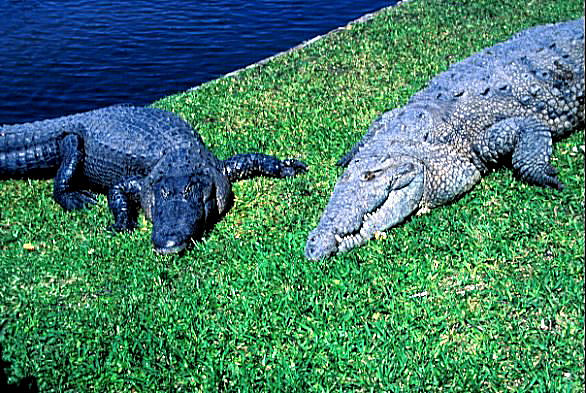One of the less known parts of DuPuis is the Powerline Grade along the eastern perimeter. A one way trip is 13 miles long and can be traveled on foot, bike, horse, or car. As the name implies, the shellrock road parallels high tension power lines running south from the FPL Indiantown plant. The southern half of the road runs between a canal (with many resident alligators) and the adjacent Corbett WMA. You may also see otters, deer, birds and various Florida fauna. Bringing your camera is recommended. Happy caching!

The American alligator (Alligator mississippiensis), sometimes referred to colloquially as a gator or common alligator, is a large crocodilian reptile endemic to the subtropical Gulf and south Atlantic region of the United States. Gators are only found in the Southeastern United States, from Great Dismal Swamp in North Carolina, south to Everglades National Park in Florida and west to the southern tip of Texas. Alligators inhabit a variety of bodies of water, from swamps to rivers to lakes. While they prefer freshwater, alligators sometimes enter more brackish water. However, they are less tolerant of saltwater than crocodiles. Alligators may den underneath banks or clumps of trees during the winter. Considered highly endangered in 1967, the alligator population was considered completely recovered by 1987.
American alligators are less vulnerable to cold than American crocodiles, and as such their range in much further north (the American crocodile is only found in deep south Florida) on the USA mainland. Unlike the crocodile, which would immediately succumb to the cold and drown in water much below 46 F (8 C), an alligator can survive in such temperatures for some time without any signs of discomfort. It is thought that this adaptiveness is the reason why American alligators spread farther north than the American crocodile.

Gators are opportunistic apex predators, eating almost any animal they can catch. Adults mostly eat fish and small mammals that they can ambush in or from the water, including domestic dogs and cats. Larger alligators may even catch deer and hogs which are dragged into the water and drowned. An alligator's jaws have massive crushing power and a strong grip, but cannot chew.
American alligators are smaller and far less aggressive than the crocodiles of Africa and Australia. The average size of an adult male alligator is 11-13 ft and 500 lbs; females are smaller - about 9 ft and 200 lbs. Gator attacks on humans are primarily caused by mistaken identity, especially at night or in water with low visibility. The other major cause of attacks are threatening a gator or its offspring. During the period 1948-2013 there have been 275 gator attacks on humans (average of 5/year) with 17 fatalities.
The alligator is the state reptile of Florida, Mississippi, and Louisiana. It is also famously the mascot of the University of Florida.